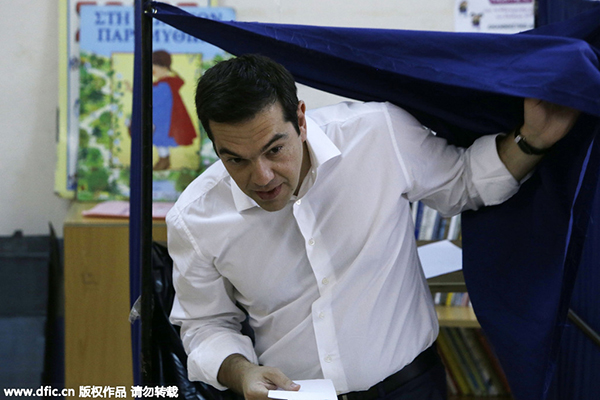Greeks defy Europe with overwhelming referendum 'No'
(Agencies) Updated: 2015-07-06 06:55
Story highlights -
* 'No' vote romps to victory with 61 pct of vote
* Result a stunning setback for EU governments
* Euro zone summit called for Tuesday
* PM Tsipras says Greece returning to negotiating table
* Euro currency falls in early Asia trade
ATHENS - Greeks overwhelmingly rejected conditions of a rescue package from creditors on Sunday, throwing the future of the country's euro zone membership into further doubt and deepening a standoff with lenders.
Stunned European leaders called a summit for Tuesday to discuss their next move after the surprisingly strong victory by the 'No' camp defied opinion polls that had predicted a tight contest.
The euro currency and stock prices in Asia fell sharply in early trade, although dealers emphasised that markets were orderly, with no signs of financial strain. European stock and bond markets were expected to take a hit when they open for trading later on Monday.
In Athens, thousands of jubilant Greeks waving flags and bursting fire crackers poured into the city's central square as official figures showed 61 percent of Greeks had rejected a deal that would have imposed more austerity measures on an already ravaged economy.
"You made a very brave choice," Prime Minister Alexis Tsipras said in a televised address. "The mandate you gave me is not the mandate of a rupture with Europe, but a mandate to strengthen our negotiating position to seek a viable solution."
The vote leaves Greece in uncharted waters: risking a banking collapse that could force it out of the euro.
Without more emergency funding from the European Central Bank, Greece's banks could run out of cash within days after a week of rising desperation as banks shut and cash machines ran dry. That might force the government to issue another currency to pay pensions and wages.
For millions of Greeks the outcome was an angry message to creditors that Greece can no longer accept repeated rounds of austerity that, in five years, had left one in four without a job and shrank the economy by a quarter.
Tsipras has denounced the price paid for aid as "blackmail", a national "humiliation".
"The message from the 'No' is that we're not scared after all the pressure that we faced from both Europe and within," said Stathis Efthimiadis, a 47-year-old teacher.
"We want to live fairly and freely within Europe."







